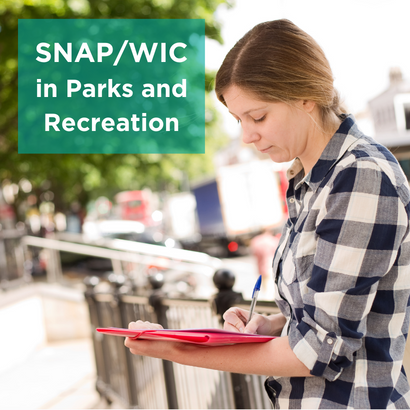
As Community Wellness Hubs, park and recreation agencies provide vital programs and services that address the diverse health and wellness needs of all people, including promoting access to healthy food. But even as park and recreation professionals work daily to address food insecurity, it remains one of the greatest public health issues nationwide, impacting more than 38 million people, including 12 million children, in the United States.
In addition to serving as one of the leading providers of healthy meals and nutrition education to children and families, park and recreation professionals are advancing and integrating new approaches to increase community-wide access to healthy food, including supporting community access to sustainable, federally funded nutrition programs like SNAP and WIC.
SNAP and WIC in Parks and Recreation
Supplemental Nutrition Assistance Program (SNAP), formerly known as food stamps, provides eligible individuals with nutrition benefits via an Electronic Benefits Transfer (EBT) card to supplement household food budgets and support self-sufficiency through purchasing power. The Special Supplemental Nutrition Program for Women, Infants and Children (WIC) provides supplemental foods, healthcare referrals and nutrition education to eligible low-income pregnant and postpartum women and children under age five.
Given the sustainability of these programs and the direct impact they can have on households, SNAP and WIC are critical programs to promote through community-based organizations working to improve health and social outcomes. While still a relatively new concept to parks and recreation (14 percent of agencies provide SNAP and/or WIC enrollment services according to the 2021 Advancing Community Health and Well-Being report), the urgent and growing needs created by the COVID-19 pandemic, and the expanded role that park and recreation agencies are playing as Community Wellness Hubs, has spurred innovative initiatives, programs and partnerships across the field to promote access to SNAP and WIC benefits.
Supporting SNAP and WIC Outreach: A Toolkit for Park and Recreation Professionals
NRPA’s SNAP and WIC Outreach Toolkit compiles guidance, support, printable resources, and promising practices for park and recreation professionals to provide SNAP/WIC outreach directly to community members, connecting them to enrollment and retention assistance for increased access to affordable and healthy foods. The toolkit is informed by on-the-ground implementation and highlights agency case studies on:
- Connecting community members to informational resources (fliers with eligibility information, etc.) and partners to support enrollment in SNAP and WIC.
- Partnering with local coalitions and SNAP enrollment providers to train park and recreation staff in benefit enrollment support and conducting food security screening and referrals.
- Developing an online questionnaire and referral system for community members to be immediately connected with information on how to apply online to eligible assistance programs.
- Hiring community health workers or AmeriCorps Vistas trained in SNAP/WIC enrollment.
- Inviting local SNAP and WIC offices to park and recreation events and sites to conduct outreach and provide enrollment support.
For more examples, check out NRPA’s Talk with Be Mighty Little Rock on the strategies they used for conducting SNAP and WIC outreach in libraries and community centers in central Arkansas.
Are you partnering with SNAP, WIC or other federal nutrition assistance programs in your community and have lessons learned to share, or challenges you would like support with? Please email health@nrpa.org to share your experiences, questions, and requests for NRPA to continue updating this toolkit to best support the field of parks and recreation.
Liliana Ruiz Fischer (she/her) is an NRPA program manager.


